Systematic - Literature Review
VerifiedAdded on 2022/08/15
|11
|2297
|15
AI Summary
Contribute Materials
Your contribution can guide someone’s learning journey. Share your
documents today.
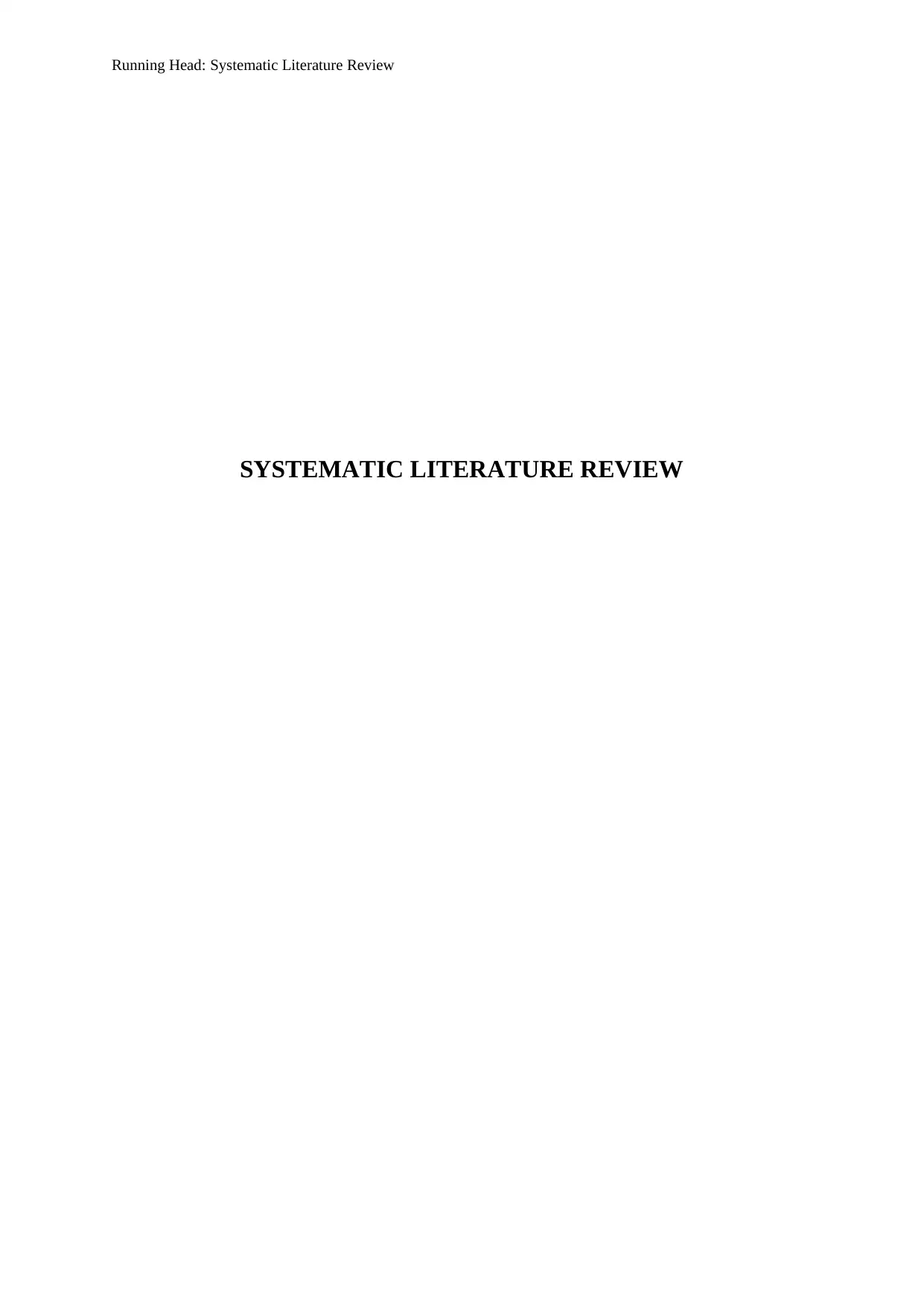
Running Head: Systematic Literature Review
SYSTEMATIC LITERATURE REVIEW
SYSTEMATIC LITERATURE REVIEW
Secure Best Marks with AI Grader
Need help grading? Try our AI Grader for instant feedback on your assignments.
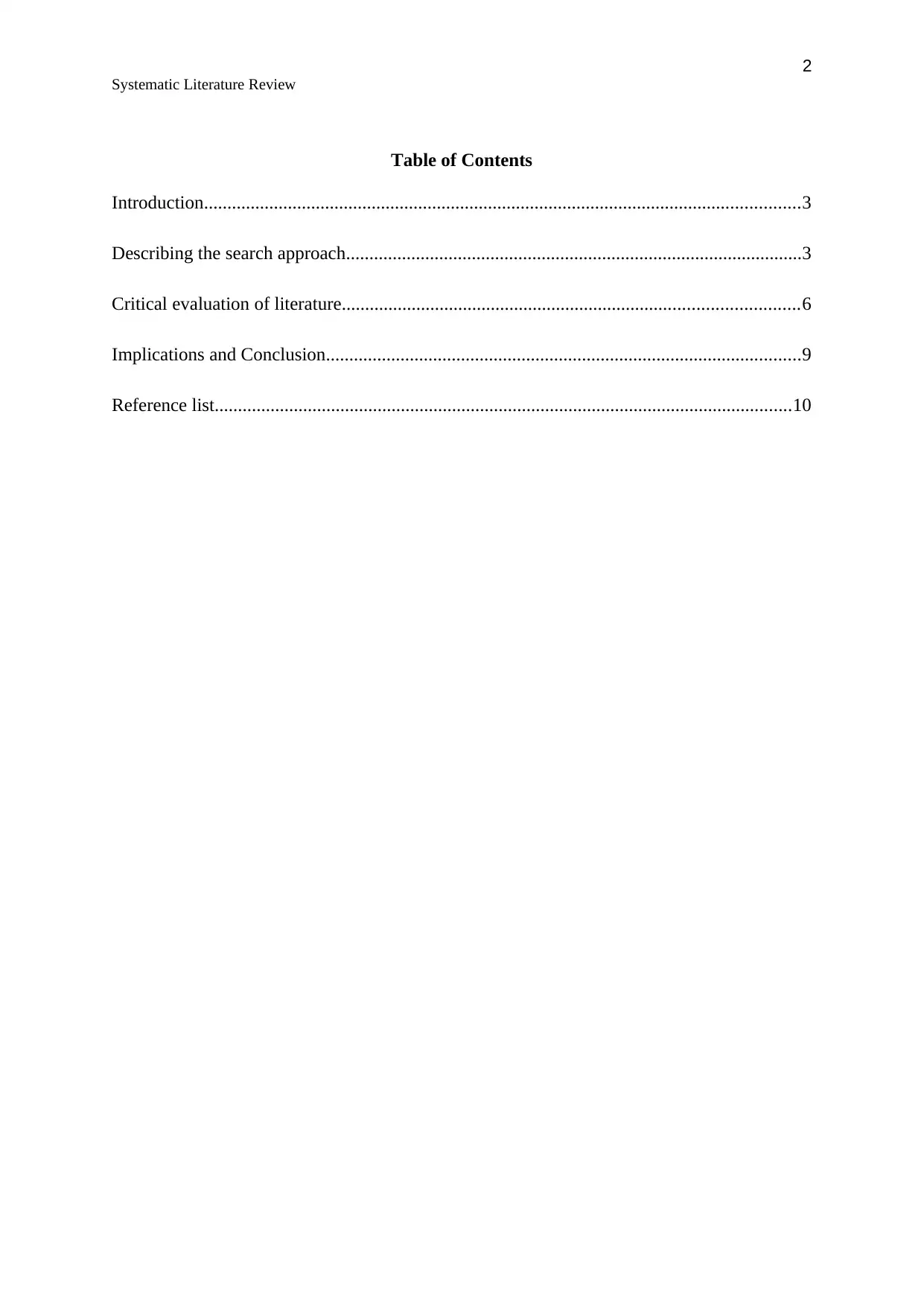
2
Systematic Literature Review
Table of Contents
Introduction................................................................................................................................3
Describing the search approach..................................................................................................3
Critical evaluation of literature..................................................................................................6
Implications and Conclusion......................................................................................................9
Reference list............................................................................................................................10
Systematic Literature Review
Table of Contents
Introduction................................................................................................................................3
Describing the search approach..................................................................................................3
Critical evaluation of literature..................................................................................................6
Implications and Conclusion......................................................................................................9
Reference list............................................................................................................................10
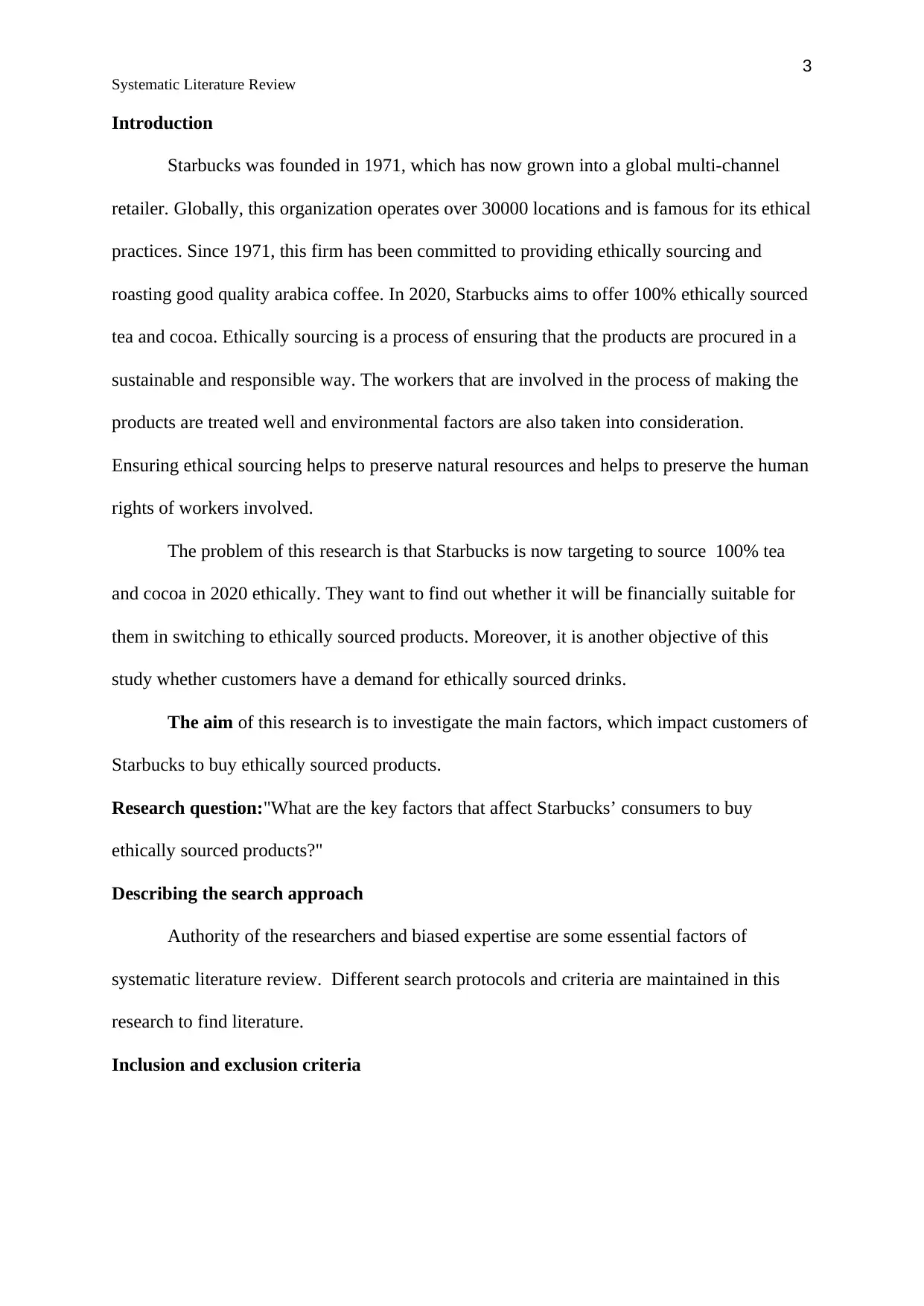
3
Systematic Literature Review
Introduction
Starbucks was founded in 1971, which has now grown into a global multi-channel
retailer. Globally, this organization operates over 30000 locations and is famous for its ethical
practices. Since 1971, this firm has been committed to providing ethically sourcing and
roasting good quality arabica coffee. In 2020, Starbucks aims to offer 100% ethically sourced
tea and cocoa. Ethically sourcing is a process of ensuring that the products are procured in a
sustainable and responsible way. The workers that are involved in the process of making the
products are treated well and environmental factors are also taken into consideration.
Ensuring ethical sourcing helps to preserve natural resources and helps to preserve the human
rights of workers involved.
The problem of this research is that Starbucks is now targeting to source 100% tea
and cocoa in 2020 ethically. They want to find out whether it will be financially suitable for
them in switching to ethically sourced products. Moreover, it is another objective of this
study whether customers have a demand for ethically sourced drinks.
The aim of this research is to investigate the main factors, which impact customers of
Starbucks to buy ethically sourced products.
Research question:"What are the key factors that affect Starbucks’ consumers to buy
ethically sourced products?"
Describing the search approach
Authority of the researchers and biased expertise are some essential factors of
systematic literature review. Different search protocols and criteria are maintained in this
research to find literature.
Inclusion and exclusion criteria
Systematic Literature Review
Introduction
Starbucks was founded in 1971, which has now grown into a global multi-channel
retailer. Globally, this organization operates over 30000 locations and is famous for its ethical
practices. Since 1971, this firm has been committed to providing ethically sourcing and
roasting good quality arabica coffee. In 2020, Starbucks aims to offer 100% ethically sourced
tea and cocoa. Ethically sourcing is a process of ensuring that the products are procured in a
sustainable and responsible way. The workers that are involved in the process of making the
products are treated well and environmental factors are also taken into consideration.
Ensuring ethical sourcing helps to preserve natural resources and helps to preserve the human
rights of workers involved.
The problem of this research is that Starbucks is now targeting to source 100% tea
and cocoa in 2020 ethically. They want to find out whether it will be financially suitable for
them in switching to ethically sourced products. Moreover, it is another objective of this
study whether customers have a demand for ethically sourced drinks.
The aim of this research is to investigate the main factors, which impact customers of
Starbucks to buy ethically sourced products.
Research question:"What are the key factors that affect Starbucks’ consumers to buy
ethically sourced products?"
Describing the search approach
Authority of the researchers and biased expertise are some essential factors of
systematic literature review. Different search protocols and criteria are maintained in this
research to find literature.
Inclusion and exclusion criteria
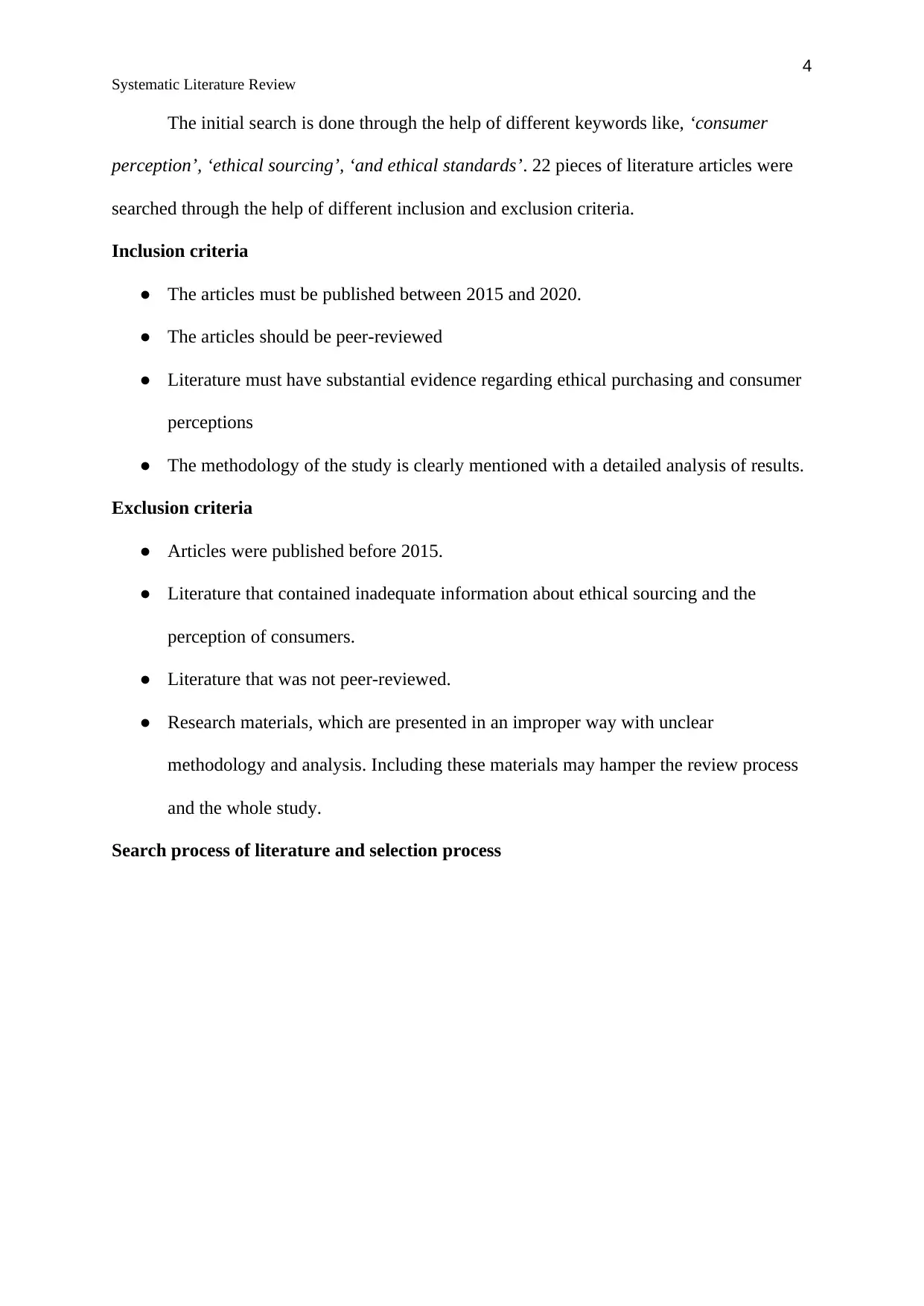
4
Systematic Literature Review
The initial search is done through the help of different keywords like, ‘consumer
perception’, ‘ethical sourcing’, ‘and ethical standards’. 22 pieces of literature articles were
searched through the help of different inclusion and exclusion criteria.
Inclusion criteria
● The articles must be published between 2015 and 2020.
● The articles should be peer-reviewed
● Literature must have substantial evidence regarding ethical purchasing and consumer
perceptions
● The methodology of the study is clearly mentioned with a detailed analysis of results.
Exclusion criteria
● Articles were published before 2015.
● Literature that contained inadequate information about ethical sourcing and the
perception of consumers.
● Literature that was not peer-reviewed.
● Research materials, which are presented in an improper way with unclear
methodology and analysis. Including these materials may hamper the review process
and the whole study.
Search process of literature and selection process
Systematic Literature Review
The initial search is done through the help of different keywords like, ‘consumer
perception’, ‘ethical sourcing’, ‘and ethical standards’. 22 pieces of literature articles were
searched through the help of different inclusion and exclusion criteria.
Inclusion criteria
● The articles must be published between 2015 and 2020.
● The articles should be peer-reviewed
● Literature must have substantial evidence regarding ethical purchasing and consumer
perceptions
● The methodology of the study is clearly mentioned with a detailed analysis of results.
Exclusion criteria
● Articles were published before 2015.
● Literature that contained inadequate information about ethical sourcing and the
perception of consumers.
● Literature that was not peer-reviewed.
● Research materials, which are presented in an improper way with unclear
methodology and analysis. Including these materials may hamper the review process
and the whole study.
Search process of literature and selection process
Secure Best Marks with AI Grader
Need help grading? Try our AI Grader for instant feedback on your assignments.
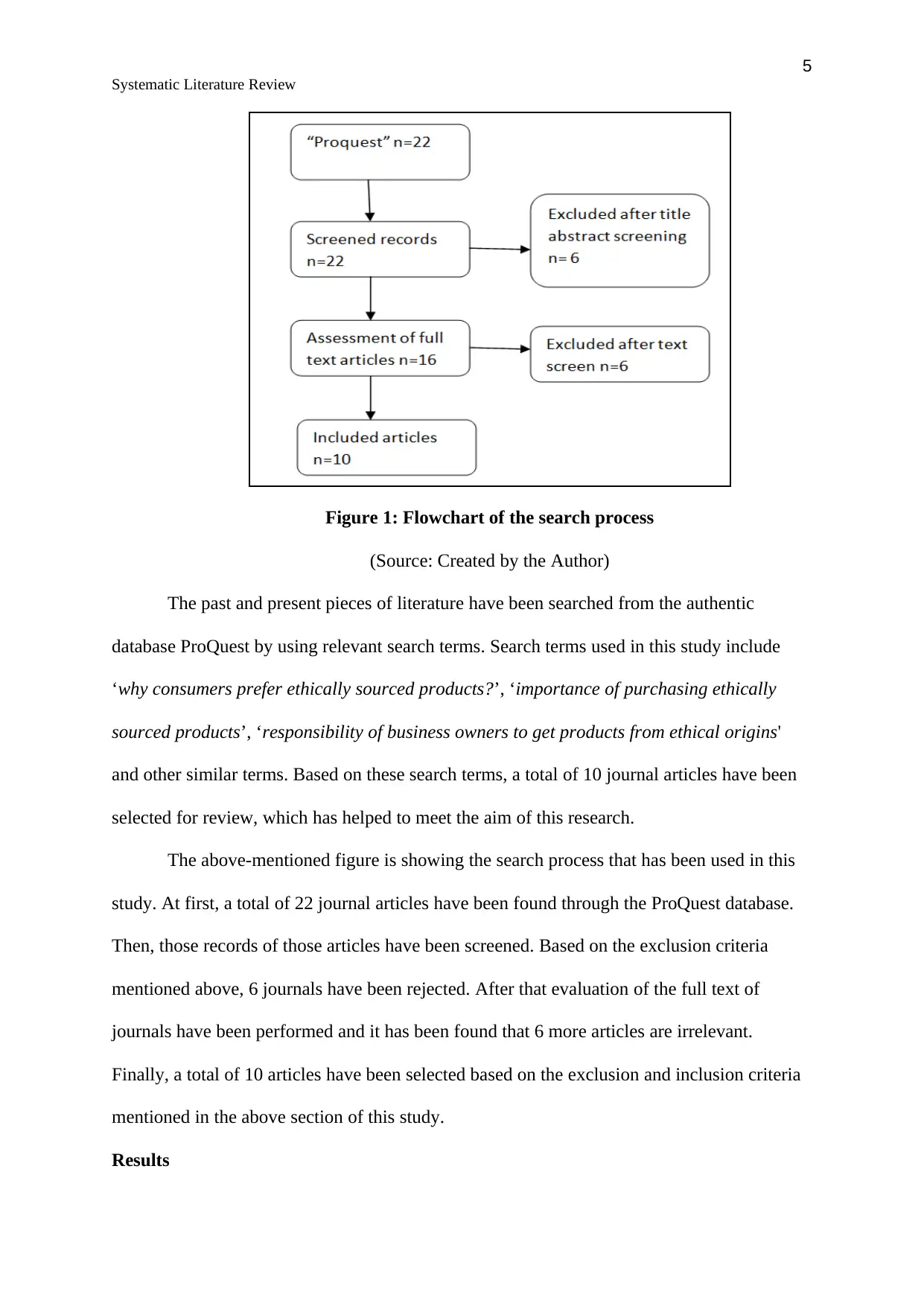
5
Systematic Literature Review
Figure 1: Flowchart of the search process
(Source: Created by the Author)
The past and present pieces of literature have been searched from the authentic
database ProQuest by using relevant search terms. Search terms used in this study include
‘why consumers prefer ethically sourced products?’, ‘importance of purchasing ethically
sourced products’, ‘responsibility of business owners to get products from ethical origins'
and other similar terms. Based on these search terms, a total of 10 journal articles have been
selected for review, which has helped to meet the aim of this research.
The above-mentioned figure is showing the search process that has been used in this
study. At first, a total of 22 journal articles have been found through the ProQuest database.
Then, those records of those articles have been screened. Based on the exclusion criteria
mentioned above, 6 journals have been rejected. After that evaluation of the full text of
journals have been performed and it has been found that 6 more articles are irrelevant.
Finally, a total of 10 articles have been selected based on the exclusion and inclusion criteria
mentioned in the above section of this study.
Results
Systematic Literature Review
Figure 1: Flowchart of the search process
(Source: Created by the Author)
The past and present pieces of literature have been searched from the authentic
database ProQuest by using relevant search terms. Search terms used in this study include
‘why consumers prefer ethically sourced products?’, ‘importance of purchasing ethically
sourced products’, ‘responsibility of business owners to get products from ethical origins'
and other similar terms. Based on these search terms, a total of 10 journal articles have been
selected for review, which has helped to meet the aim of this research.
The above-mentioned figure is showing the search process that has been used in this
study. At first, a total of 22 journal articles have been found through the ProQuest database.
Then, those records of those articles have been screened. Based on the exclusion criteria
mentioned above, 6 journals have been rejected. After that evaluation of the full text of
journals have been performed and it has been found that 6 more articles are irrelevant.
Finally, a total of 10 articles have been selected based on the exclusion and inclusion criteria
mentioned in the above section of this study.
Results
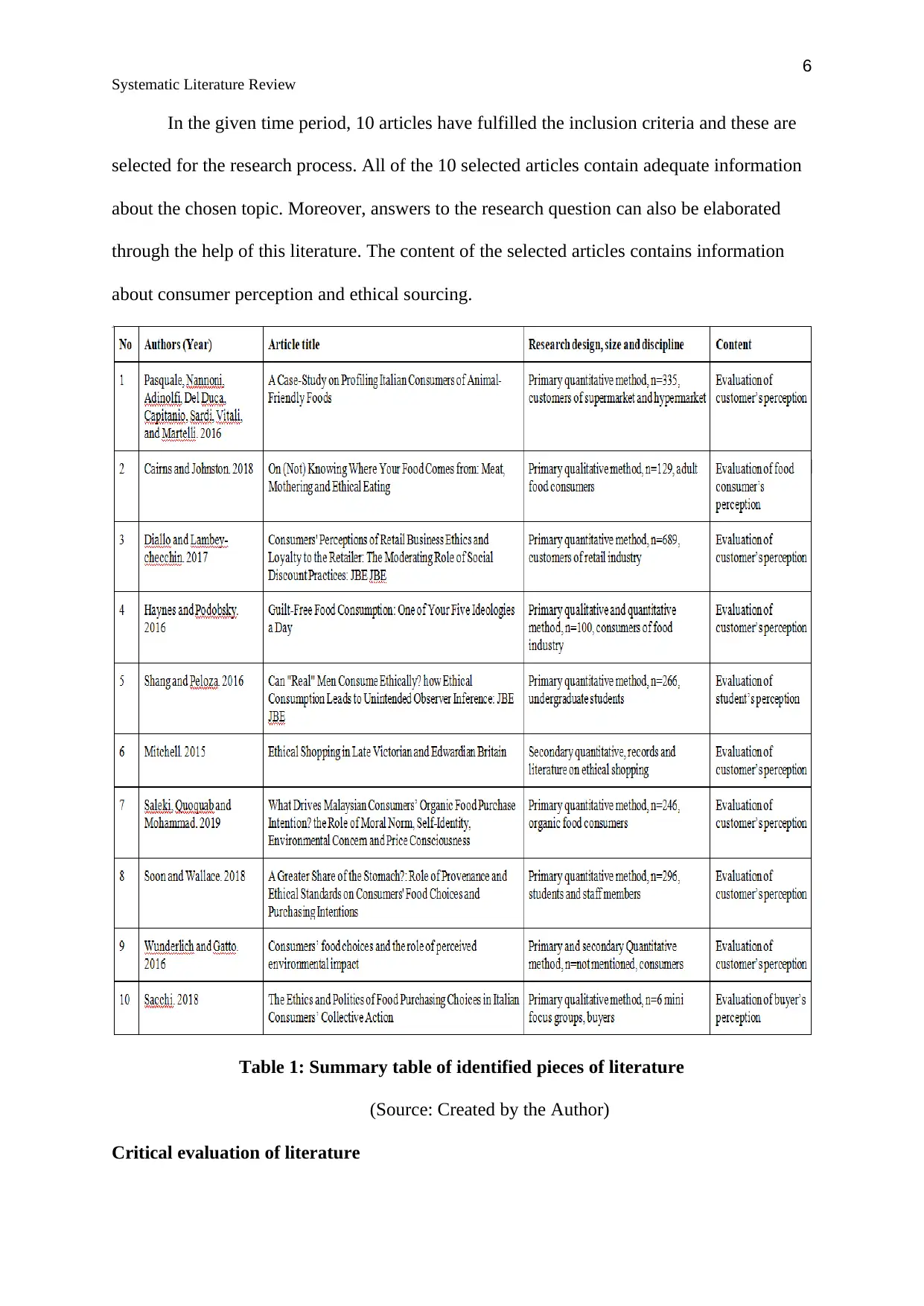
6
Systematic Literature Review
In the given time period, 10 articles have fulfilled the inclusion criteria and these are
selected for the research process. All of the 10 selected articles contain adequate information
about the chosen topic. Moreover, answers to the research question can also be elaborated
through the help of this literature. The content of the selected articles contains information
about consumer perception and ethical sourcing.
Table 1: Summary table of identified pieces of literature
(Source: Created by the Author)
Critical evaluation of literature
Systematic Literature Review
In the given time period, 10 articles have fulfilled the inclusion criteria and these are
selected for the research process. All of the 10 selected articles contain adequate information
about the chosen topic. Moreover, answers to the research question can also be elaborated
through the help of this literature. The content of the selected articles contains information
about consumer perception and ethical sourcing.
Table 1: Summary table of identified pieces of literature
(Source: Created by the Author)
Critical evaluation of literature
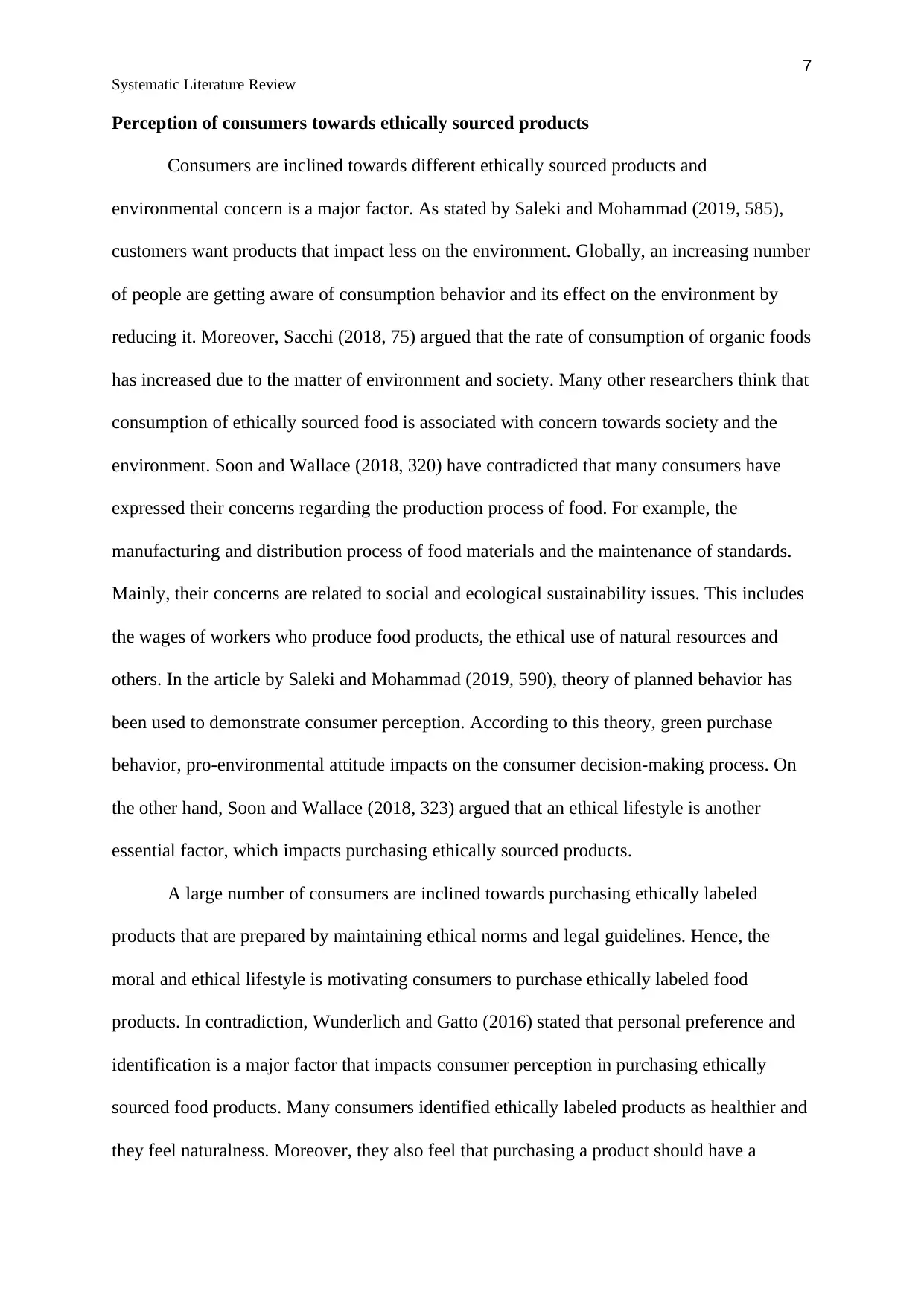
7
Systematic Literature Review
Perception of consumers towards ethically sourced products
Consumers are inclined towards different ethically sourced products and
environmental concern is a major factor. As stated by Saleki and Mohammad (2019, 585),
customers want products that impact less on the environment. Globally, an increasing number
of people are getting aware of consumption behavior and its effect on the environment by
reducing it. Moreover, Sacchi (2018, 75) argued that the rate of consumption of organic foods
has increased due to the matter of environment and society. Many other researchers think that
consumption of ethically sourced food is associated with concern towards society and the
environment. Soon and Wallace (2018, 320) have contradicted that many consumers have
expressed their concerns regarding the production process of food. For example, the
manufacturing and distribution process of food materials and the maintenance of standards.
Mainly, their concerns are related to social and ecological sustainability issues. This includes
the wages of workers who produce food products, the ethical use of natural resources and
others. In the article by Saleki and Mohammad (2019, 590), theory of planned behavior has
been used to demonstrate consumer perception. According to this theory, green purchase
behavior, pro-environmental attitude impacts on the consumer decision-making process. On
the other hand, Soon and Wallace (2018, 323) argued that an ethical lifestyle is another
essential factor, which impacts purchasing ethically sourced products.
A large number of consumers are inclined towards purchasing ethically labeled
products that are prepared by maintaining ethical norms and legal guidelines. Hence, the
moral and ethical lifestyle is motivating consumers to purchase ethically labeled food
products. In contradiction, Wunderlich and Gatto (2016) stated that personal preference and
identification is a major factor that impacts consumer perception in purchasing ethically
sourced food products. Many consumers identified ethically labeled products as healthier and
they feel naturalness. Moreover, they also feel that purchasing a product should have a
Systematic Literature Review
Perception of consumers towards ethically sourced products
Consumers are inclined towards different ethically sourced products and
environmental concern is a major factor. As stated by Saleki and Mohammad (2019, 585),
customers want products that impact less on the environment. Globally, an increasing number
of people are getting aware of consumption behavior and its effect on the environment by
reducing it. Moreover, Sacchi (2018, 75) argued that the rate of consumption of organic foods
has increased due to the matter of environment and society. Many other researchers think that
consumption of ethically sourced food is associated with concern towards society and the
environment. Soon and Wallace (2018, 320) have contradicted that many consumers have
expressed their concerns regarding the production process of food. For example, the
manufacturing and distribution process of food materials and the maintenance of standards.
Mainly, their concerns are related to social and ecological sustainability issues. This includes
the wages of workers who produce food products, the ethical use of natural resources and
others. In the article by Saleki and Mohammad (2019, 590), theory of planned behavior has
been used to demonstrate consumer perception. According to this theory, green purchase
behavior, pro-environmental attitude impacts on the consumer decision-making process. On
the other hand, Soon and Wallace (2018, 323) argued that an ethical lifestyle is another
essential factor, which impacts purchasing ethically sourced products.
A large number of consumers are inclined towards purchasing ethically labeled
products that are prepared by maintaining ethical norms and legal guidelines. Hence, the
moral and ethical lifestyle is motivating consumers to purchase ethically labeled food
products. In contradiction, Wunderlich and Gatto (2016) stated that personal preference and
identification is a major factor that impacts consumer perception in purchasing ethically
sourced food products. Many consumers identified ethically labeled products as healthier and
they feel naturalness. Moreover, they also feel that purchasing a product should have a
Paraphrase This Document
Need a fresh take? Get an instant paraphrase of this document with our AI Paraphraser
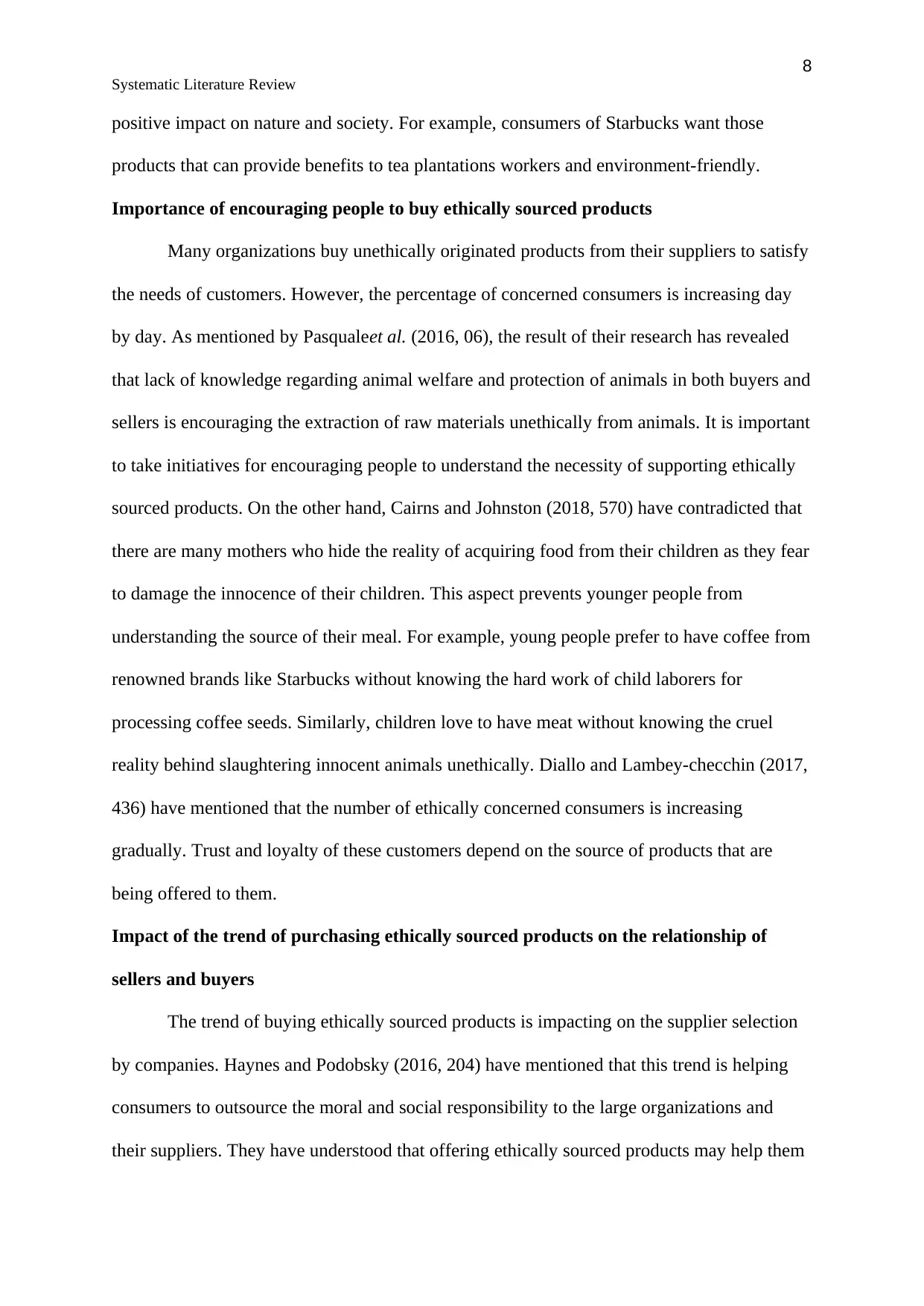
8
Systematic Literature Review
positive impact on nature and society. For example, consumers of Starbucks want those
products that can provide benefits to tea plantations workers and environment-friendly.
Importance of encouraging people to buy ethically sourced products
Many organizations buy unethically originated products from their suppliers to satisfy
the needs of customers. However, the percentage of concerned consumers is increasing day
by day. As mentioned by Pasqualeet al. (2016, 06), the result of their research has revealed
that lack of knowledge regarding animal welfare and protection of animals in both buyers and
sellers is encouraging the extraction of raw materials unethically from animals. It is important
to take initiatives for encouraging people to understand the necessity of supporting ethically
sourced products. On the other hand, Cairns and Johnston (2018, 570) have contradicted that
there are many mothers who hide the reality of acquiring food from their children as they fear
to damage the innocence of their children. This aspect prevents younger people from
understanding the source of their meal. For example, young people prefer to have coffee from
renowned brands like Starbucks without knowing the hard work of child laborers for
processing coffee seeds. Similarly, children love to have meat without knowing the cruel
reality behind slaughtering innocent animals unethically. Diallo and Lambey-checchin (2017,
436) have mentioned that the number of ethically concerned consumers is increasing
gradually. Trust and loyalty of these customers depend on the source of products that are
being offered to them.
Impact of the trend of purchasing ethically sourced products on the relationship of
sellers and buyers
The trend of buying ethically sourced products is impacting on the supplier selection
by companies. Haynes and Podobsky (2016, 204) have mentioned that this trend is helping
consumers to outsource the moral and social responsibility to the large organizations and
their suppliers. They have understood that offering ethically sourced products may help them
Systematic Literature Review
positive impact on nature and society. For example, consumers of Starbucks want those
products that can provide benefits to tea plantations workers and environment-friendly.
Importance of encouraging people to buy ethically sourced products
Many organizations buy unethically originated products from their suppliers to satisfy
the needs of customers. However, the percentage of concerned consumers is increasing day
by day. As mentioned by Pasqualeet al. (2016, 06), the result of their research has revealed
that lack of knowledge regarding animal welfare and protection of animals in both buyers and
sellers is encouraging the extraction of raw materials unethically from animals. It is important
to take initiatives for encouraging people to understand the necessity of supporting ethically
sourced products. On the other hand, Cairns and Johnston (2018, 570) have contradicted that
there are many mothers who hide the reality of acquiring food from their children as they fear
to damage the innocence of their children. This aspect prevents younger people from
understanding the source of their meal. For example, young people prefer to have coffee from
renowned brands like Starbucks without knowing the hard work of child laborers for
processing coffee seeds. Similarly, children love to have meat without knowing the cruel
reality behind slaughtering innocent animals unethically. Diallo and Lambey-checchin (2017,
436) have mentioned that the number of ethically concerned consumers is increasing
gradually. Trust and loyalty of these customers depend on the source of products that are
being offered to them.
Impact of the trend of purchasing ethically sourced products on the relationship of
sellers and buyers
The trend of buying ethically sourced products is impacting on the supplier selection
by companies. Haynes and Podobsky (2016, 204) have mentioned that this trend is helping
consumers to outsource the moral and social responsibility to the large organizations and
their suppliers. They have understood that offering ethically sourced products may help them
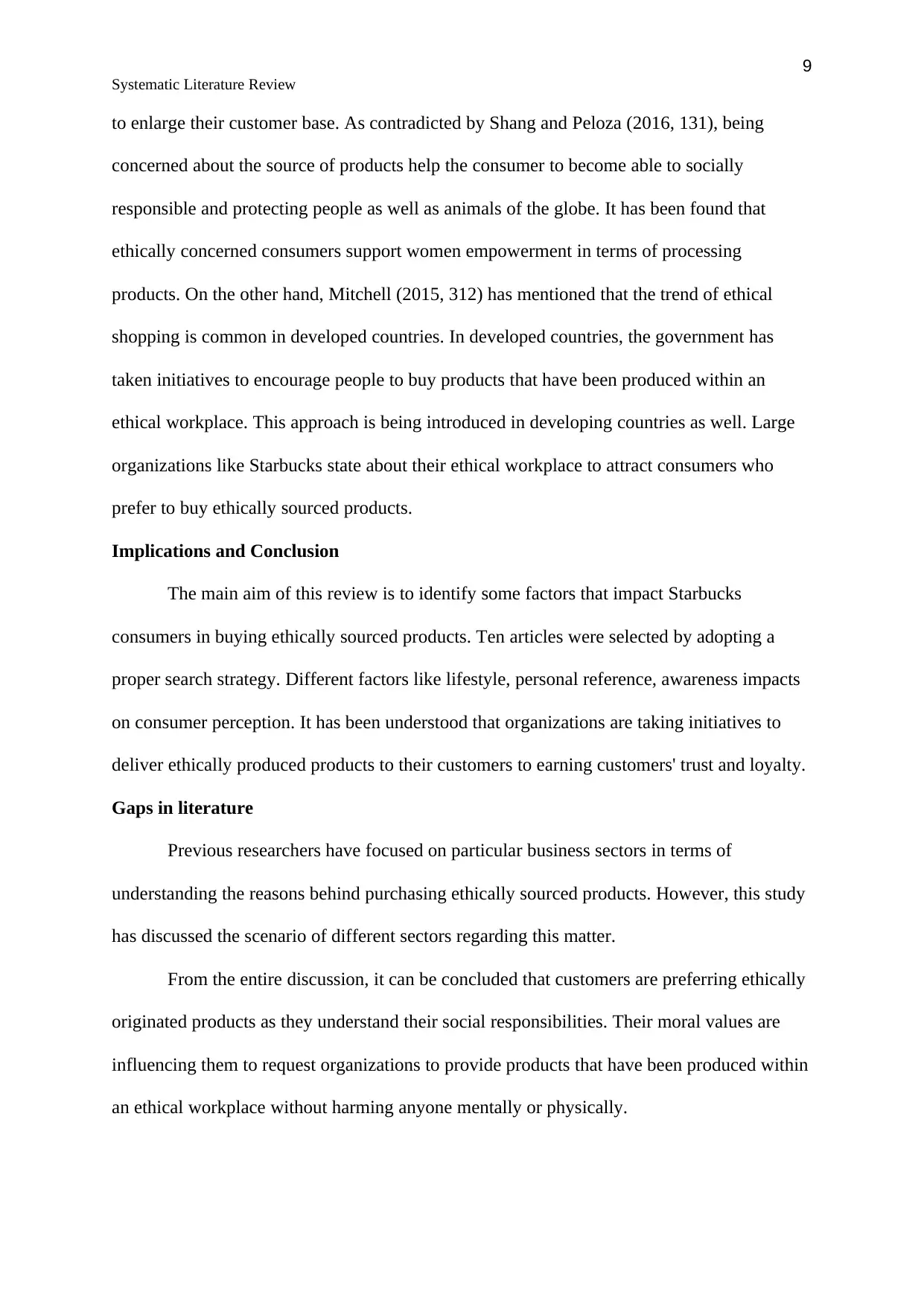
9
Systematic Literature Review
to enlarge their customer base. As contradicted by Shang and Peloza (2016, 131), being
concerned about the source of products help the consumer to become able to socially
responsible and protecting people as well as animals of the globe. It has been found that
ethically concerned consumers support women empowerment in terms of processing
products. On the other hand, Mitchell (2015, 312) has mentioned that the trend of ethical
shopping is common in developed countries. In developed countries, the government has
taken initiatives to encourage people to buy products that have been produced within an
ethical workplace. This approach is being introduced in developing countries as well. Large
organizations like Starbucks state about their ethical workplace to attract consumers who
prefer to buy ethically sourced products.
Implications and Conclusion
The main aim of this review is to identify some factors that impact Starbucks
consumers in buying ethically sourced products. Ten articles were selected by adopting a
proper search strategy. Different factors like lifestyle, personal reference, awareness impacts
on consumer perception. It has been understood that organizations are taking initiatives to
deliver ethically produced products to their customers to earning customers' trust and loyalty.
Gaps in literature
Previous researchers have focused on particular business sectors in terms of
understanding the reasons behind purchasing ethically sourced products. However, this study
has discussed the scenario of different sectors regarding this matter.
From the entire discussion, it can be concluded that customers are preferring ethically
originated products as they understand their social responsibilities. Their moral values are
influencing them to request organizations to provide products that have been produced within
an ethical workplace without harming anyone mentally or physically.
Systematic Literature Review
to enlarge their customer base. As contradicted by Shang and Peloza (2016, 131), being
concerned about the source of products help the consumer to become able to socially
responsible and protecting people as well as animals of the globe. It has been found that
ethically concerned consumers support women empowerment in terms of processing
products. On the other hand, Mitchell (2015, 312) has mentioned that the trend of ethical
shopping is common in developed countries. In developed countries, the government has
taken initiatives to encourage people to buy products that have been produced within an
ethical workplace. This approach is being introduced in developing countries as well. Large
organizations like Starbucks state about their ethical workplace to attract consumers who
prefer to buy ethically sourced products.
Implications and Conclusion
The main aim of this review is to identify some factors that impact Starbucks
consumers in buying ethically sourced products. Ten articles were selected by adopting a
proper search strategy. Different factors like lifestyle, personal reference, awareness impacts
on consumer perception. It has been understood that organizations are taking initiatives to
deliver ethically produced products to their customers to earning customers' trust and loyalty.
Gaps in literature
Previous researchers have focused on particular business sectors in terms of
understanding the reasons behind purchasing ethically sourced products. However, this study
has discussed the scenario of different sectors regarding this matter.
From the entire discussion, it can be concluded that customers are preferring ethically
originated products as they understand their social responsibilities. Their moral values are
influencing them to request organizations to provide products that have been produced within
an ethical workplace without harming anyone mentally or physically.
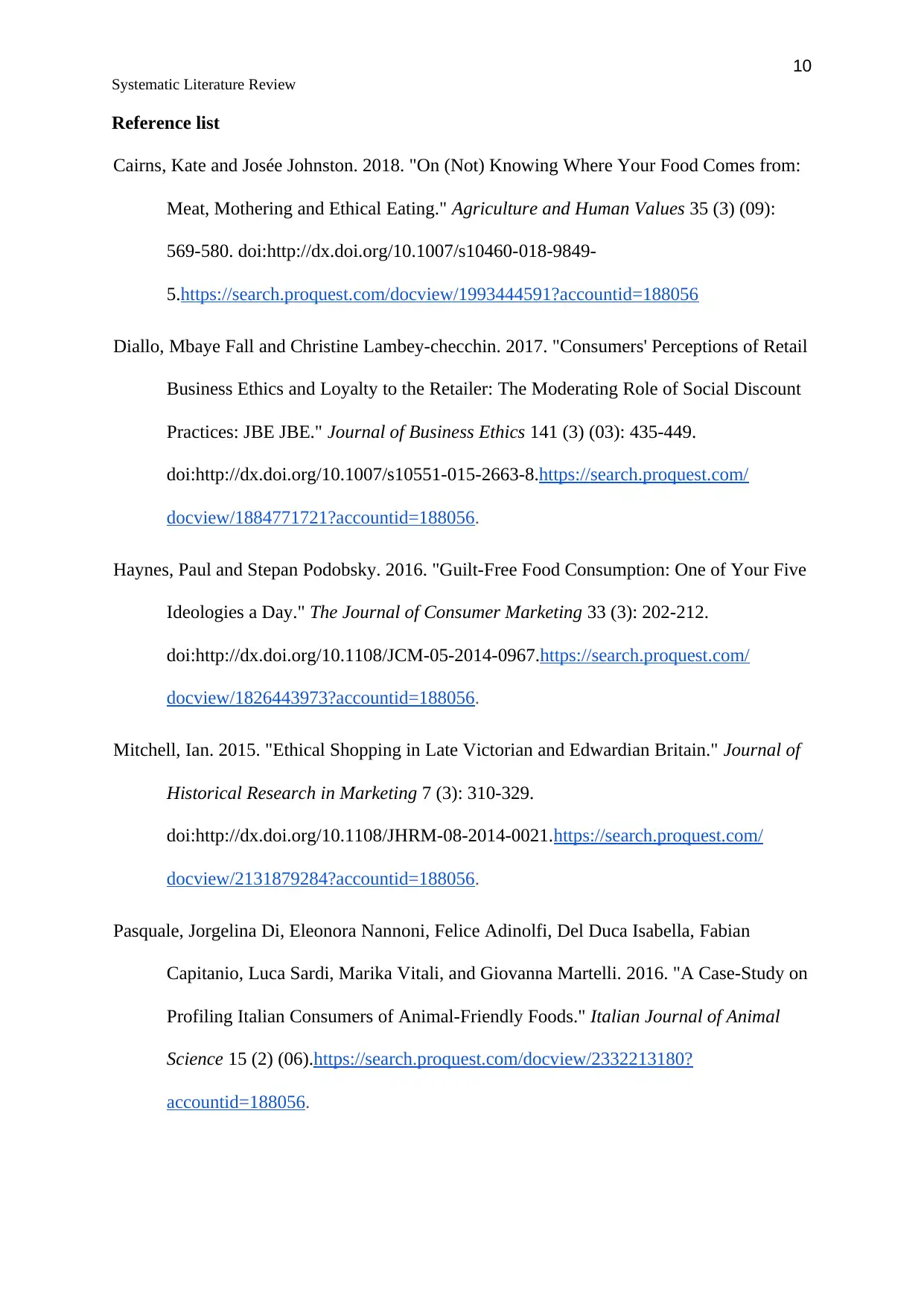
10
Systematic Literature Review
Reference list
Cairns, Kate and Josée Johnston. 2018. "On (Not) Knowing Where Your Food Comes from:
Meat, Mothering and Ethical Eating." Agriculture and Human Values 35 (3) (09):
569-580. doi:http://dx.doi.org/10.1007/s10460-018-9849-
5.https://search.proquest.com/docview/1993444591?accountid=188056
Diallo, Mbaye Fall and Christine Lambey-checchin. 2017. "Consumers' Perceptions of Retail
Business Ethics and Loyalty to the Retailer: The Moderating Role of Social Discount
Practices: JBE JBE." Journal of Business Ethics 141 (3) (03): 435-449.
doi:http://dx.doi.org/10.1007/s10551-015-2663-8.https://search.proquest.com/
docview/1884771721?accountid=188056.
Haynes, Paul and Stepan Podobsky. 2016. "Guilt-Free Food Consumption: One of Your Five
Ideologies a Day." The Journal of Consumer Marketing 33 (3): 202-212.
doi:http://dx.doi.org/10.1108/JCM-05-2014-0967.https://search.proquest.com/
docview/1826443973?accountid=188056.
Mitchell, Ian. 2015. "Ethical Shopping in Late Victorian and Edwardian Britain." Journal of
Historical Research in Marketing 7 (3): 310-329.
doi:http://dx.doi.org/10.1108/JHRM-08-2014-0021.https://search.proquest.com/
docview/2131879284?accountid=188056.
Pasquale, Jorgelina Di, Eleonora Nannoni, Felice Adinolfi, Del Duca Isabella, Fabian
Capitanio, Luca Sardi, Marika Vitali, and Giovanna Martelli. 2016. "A Case-Study on
Profiling Italian Consumers of Animal-Friendly Foods." Italian Journal of Animal
Science 15 (2) (06).https://search.proquest.com/docview/2332213180?
accountid=188056.
Systematic Literature Review
Reference list
Cairns, Kate and Josée Johnston. 2018. "On (Not) Knowing Where Your Food Comes from:
Meat, Mothering and Ethical Eating." Agriculture and Human Values 35 (3) (09):
569-580. doi:http://dx.doi.org/10.1007/s10460-018-9849-
5.https://search.proquest.com/docview/1993444591?accountid=188056
Diallo, Mbaye Fall and Christine Lambey-checchin. 2017. "Consumers' Perceptions of Retail
Business Ethics and Loyalty to the Retailer: The Moderating Role of Social Discount
Practices: JBE JBE." Journal of Business Ethics 141 (3) (03): 435-449.
doi:http://dx.doi.org/10.1007/s10551-015-2663-8.https://search.proquest.com/
docview/1884771721?accountid=188056.
Haynes, Paul and Stepan Podobsky. 2016. "Guilt-Free Food Consumption: One of Your Five
Ideologies a Day." The Journal of Consumer Marketing 33 (3): 202-212.
doi:http://dx.doi.org/10.1108/JCM-05-2014-0967.https://search.proquest.com/
docview/1826443973?accountid=188056.
Mitchell, Ian. 2015. "Ethical Shopping in Late Victorian and Edwardian Britain." Journal of
Historical Research in Marketing 7 (3): 310-329.
doi:http://dx.doi.org/10.1108/JHRM-08-2014-0021.https://search.proquest.com/
docview/2131879284?accountid=188056.
Pasquale, Jorgelina Di, Eleonora Nannoni, Felice Adinolfi, Del Duca Isabella, Fabian
Capitanio, Luca Sardi, Marika Vitali, and Giovanna Martelli. 2016. "A Case-Study on
Profiling Italian Consumers of Animal-Friendly Foods." Italian Journal of Animal
Science 15 (2) (06).https://search.proquest.com/docview/2332213180?
accountid=188056.
Secure Best Marks with AI Grader
Need help grading? Try our AI Grader for instant feedback on your assignments.
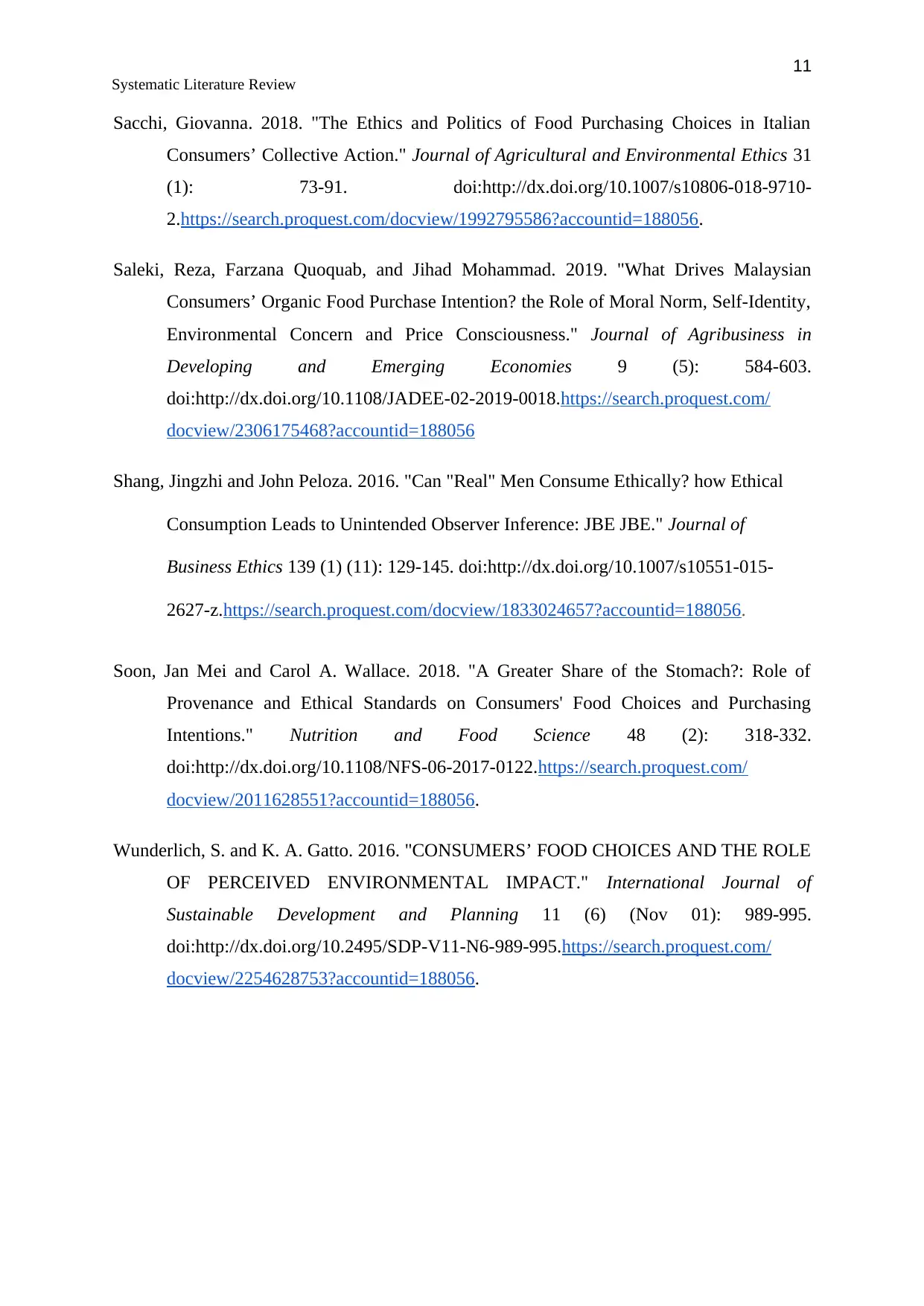
11
Systematic Literature Review
Sacchi, Giovanna. 2018. "The Ethics and Politics of Food Purchasing Choices in Italian
Consumers’ Collective Action." Journal of Agricultural and Environmental Ethics 31
(1): 73-91. doi:http://dx.doi.org/10.1007/s10806-018-9710-
2.https://search.proquest.com/docview/1992795586?accountid=188056.
Saleki, Reza, Farzana Quoquab, and Jihad Mohammad. 2019. "What Drives Malaysian
Consumers’ Organic Food Purchase Intention? the Role of Moral Norm, Self-Identity,
Environmental Concern and Price Consciousness." Journal of Agribusiness in
Developing and Emerging Economies 9 (5): 584-603.
doi:http://dx.doi.org/10.1108/JADEE-02-2019-0018.https://search.proquest.com/
docview/2306175468?accountid=188056
Shang, Jingzhi and John Peloza. 2016. "Can "Real" Men Consume Ethically? how Ethical
Consumption Leads to Unintended Observer Inference: JBE JBE." Journal of
Business Ethics 139 (1) (11): 129-145. doi:http://dx.doi.org/10.1007/s10551-015-
2627-z.https://search.proquest.com/docview/1833024657?accountid=188056.
Soon, Jan Mei and Carol A. Wallace. 2018. "A Greater Share of the Stomach?: Role of
Provenance and Ethical Standards on Consumers' Food Choices and Purchasing
Intentions." Nutrition and Food Science 48 (2): 318-332.
doi:http://dx.doi.org/10.1108/NFS-06-2017-0122.https://search.proquest.com/
docview/2011628551?accountid=188056.
Wunderlich, S. and K. A. Gatto. 2016. "CONSUMERS’ FOOD CHOICES AND THE ROLE
OF PERCEIVED ENVIRONMENTAL IMPACT." International Journal of
Sustainable Development and Planning 11 (6) (Nov 01): 989-995.
doi:http://dx.doi.org/10.2495/SDP-V11-N6-989-995.https://search.proquest.com/
docview/2254628753?accountid=188056.
Systematic Literature Review
Sacchi, Giovanna. 2018. "The Ethics and Politics of Food Purchasing Choices in Italian
Consumers’ Collective Action." Journal of Agricultural and Environmental Ethics 31
(1): 73-91. doi:http://dx.doi.org/10.1007/s10806-018-9710-
2.https://search.proquest.com/docview/1992795586?accountid=188056.
Saleki, Reza, Farzana Quoquab, and Jihad Mohammad. 2019. "What Drives Malaysian
Consumers’ Organic Food Purchase Intention? the Role of Moral Norm, Self-Identity,
Environmental Concern and Price Consciousness." Journal of Agribusiness in
Developing and Emerging Economies 9 (5): 584-603.
doi:http://dx.doi.org/10.1108/JADEE-02-2019-0018.https://search.proquest.com/
docview/2306175468?accountid=188056
Shang, Jingzhi and John Peloza. 2016. "Can "Real" Men Consume Ethically? how Ethical
Consumption Leads to Unintended Observer Inference: JBE JBE." Journal of
Business Ethics 139 (1) (11): 129-145. doi:http://dx.doi.org/10.1007/s10551-015-
2627-z.https://search.proquest.com/docview/1833024657?accountid=188056.
Soon, Jan Mei and Carol A. Wallace. 2018. "A Greater Share of the Stomach?: Role of
Provenance and Ethical Standards on Consumers' Food Choices and Purchasing
Intentions." Nutrition and Food Science 48 (2): 318-332.
doi:http://dx.doi.org/10.1108/NFS-06-2017-0122.https://search.proquest.com/
docview/2011628551?accountid=188056.
Wunderlich, S. and K. A. Gatto. 2016. "CONSUMERS’ FOOD CHOICES AND THE ROLE
OF PERCEIVED ENVIRONMENTAL IMPACT." International Journal of
Sustainable Development and Planning 11 (6) (Nov 01): 989-995.
doi:http://dx.doi.org/10.2495/SDP-V11-N6-989-995.https://search.proquest.com/
docview/2254628753?accountid=188056.
1 out of 11
Your All-in-One AI-Powered Toolkit for Academic Success.
+13062052269
info@desklib.com
Available 24*7 on WhatsApp / Email
![[object Object]](/_next/static/media/star-bottom.7253800d.svg)
Unlock your academic potential
© 2024 | Zucol Services PVT LTD | All rights reserved.





